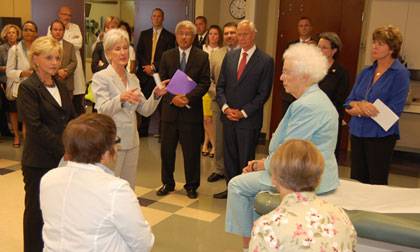
Duke University Hospital and Health System is among five hospitals in the country that will participate in a four-year, $200 million project by the U.S. Department of Health and Human Services designed to dramatically increase the number of advanced practice nurses providing primary care in underserved areas.
The ambitious initiative, announced today at the Duke University School of Nursing by HHS Secretary Kathleen Sebelius, will help achieve the goals of the Affordable Care Act to increase health care access, cut costs and ensure high quality by significantly expanding the number of nurses with advanced degrees who can deliver primary care.
"With this important initiative, we are putting more advanced practice nurses on the front lines of our health care system and further strengthening and growing our primary care workforce," Sebelius said.
As part of the four-year initiative, Duke Medicine will double the number of advanced practice nurses it trains, enrolling 216 additional learners a year by 2016. All will train at sites participating through collaborations with Duke's network of community clinics, three community hospitals, affiliated primary care practices, the School of Medicine and the School of Nursing.
This network of community care providers spans a 14-county area that includes the fast-growing Triangle, which is also projected to experience a rapid rise in the number of older patients over the next decade. To meet the needs of these patients, the Duke initiative will emphasize elder care and population health in training the new corps of nurse practitioners (NP), certified registered nurse anesthetists (CRNA) and clinical nurse specialists (CNS)
"As this project demonstrates, Duke Medicine is uniquely positioned as a leader with innovative solutions to meet the accelerating demand for primary care services and providers in our communities," said Victor J. Dzau, M.D., president and chief executive officer of Duke University Health System. "The complexity of the challenge to make care more accessible and affordable, while enhancing quality, is exacerbated by the continuing decline in the number of primary care physicians and the expected influx of patients into the healthcare system as a result of health care reform. We are proud to be a part of this important effort to help solve this problem."
Funding to accommodate the additional nursing school enrollments will be provided by the HHS project, which has slated $50 million a year to be divided among the five participating sites to defray the costs of the training programs. Duke Medicine estimates it will cost about $49,000 a year to train each nurse practitioner.
A key goal of the program is for students who are trained as part of the new initiative to practice in underserved areas providing primary care, as opposed to acute care in hospitals.
As a requirement of the HHS project, half of all clinical training will occur in non-hospital settings, strengthening the nurses' skills in handling preventive services, chronic disease management and other primary care needs. The nursing students will work with specially trained preceptors and instructors at the various project partners:
- Duke Primary Care: a network of Duke University affiliated physicians that currently has 27 locations in the region;
- The Division of Community Health in Duke's Department of Community and Family Medicine, in partnership with Lincoln Community Health Center, Lyon Park Community Center, Walltown Neighborhood Clinic, Holton Wellness Center, and Northern Piedmont Community Care;
- Duke Medicine's Division of Family Medicine, which provides care through the Duke Family Medicine Center;
- Healing with CAARE, Inc., a non-profit community clinic that provides free health services in Durham;
- Private Diagnostic Clinic, which comprises Duke's faculty physicians;
- Community hospitals at Maria Parham Medical Center in Henderson and Person Memorial Hospital in Roxboro, which are both affiliated with Duke LifePoint Healthcare; and Danville Regional Medical Center in Danville, Va.
- Duke School of Nursing, which is ranked #7 in the nation by U.S. News & World Report.
Duke Medicine has long been a leader in expanding the primary care workforce, pioneering the physician assistant profession and working to develop a community-based medical home model that aims to provide the right level of care at the right time and place.
"This innovative initiative will improve patient care and allow our primary care teams to more effectively manage patient volumes and provide the appropriate level of care to patients with various needs," said John Anderson, M.D., chief medical officer for Duke Primary Care. "Primary care physicians will be able to focus more of their efforts on patients with complex medical needs and management, as we develop a team approach to care delivery enhanced by the greater inclusion of nurse practitioners."
"Nurse practitioners and nurse anesthetists are at the forefront of providing care to thousands of people every day and the need for these highly-qualified nurses will continue to increase dramatically," said Catherine L. Gilliss, DNSc, RN, FAAN, dean of Duke University School of Nursing, Helene Fuld Health Trust Professor of Nursing, and vice chancellor for nursing affairs. "This innovative program that provides education and training is also important in shaping federal policy in support of advanced level nurses. Ultimately, it brings together nursing education with clinical practice in the service of reforming our nation's health care system."
Mary Ann Fuchs, vice president of Patient Care and system chief nurse executive for the Duke University Health System, said the Duke program will prepare a work force uniquely able to meet the demands of a rapidly changing health care environment.
"We are developing our advanced practice registered nurses to play a critical role in the development and evolution of a regional care infrastructure that is more accessible, cost effective and responsive to the needs of our region," Fuchs said. "We are eager to begin the project, and are excited about this historic opportunity for the patients we serve, our students, local communities and state."